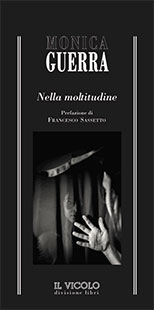
Nella moltitudine (Il vicolo, 2020)
Prefazione di Francesco Sassetto
Ci sono libri di poesia che si cercano, libri che capitano per caso tra le mani, libri che si attendono. È quest’ultimo il caso dell’ottima quarta opera di Monica Guerra dopo Semi di sé , Sottovuoto e Sulla soglia. In quest’ultima raccolta Monica mette ulteriormente a fuoco, con rigo- re e lucida consapevolezza, i motivi dominanti di un orizzonte poetico ed umano coerente, denso ed in- tenso, lungamente meditato per sfociare poi, in un breve giro di anni, sulla carta. Perché i testi vengo- no da lontano ed arrivano a farsi poesia – verso o “prosa poetica” poco importa – per stratificazioni successive di dati esperienziali che trovano il pro- prio habitus stilistico-formale, la loro piena e nitida espressione, solo nel tempo, costruendo un dettato poetico – e questo è ciò che conta – di forte impatto emotivo, sofferto e commovente (nel senso etimolo- gico del temine) nella sua disarmata verità, nella sua dolente umanità dove – non credo di esagerare – ogni parola è, per dirla con Ungaretti, «scavata nella mia vita / come un abisso». Perciò ho parlato di questo come di un libro di poesia «che si doveva attendere».
Varia e saldamente articolata appare la struttura compositiva dell’opera, divisa in quattro sezioni, quasi quattro “tempi” di una sinfonia. La prima,maddalene, composta di venti prose poetiche, l’architrave del libro, seguita dalle sezioni la cor- rente del silenzio e nella moltitudine che riunisco- no nove brevi liriche ciascuna, per chiudersi con  nel conto alla rovescia, che racchiude altre sei prose, mesta elegia della perdita irreparabile. L’intera raccolta, ma soprattutto le maddalene, una sorta di “stazioni”, riflessioni e pensieri di un cammino che mira ad un futuro da scrutare con la voce dentro il pugno, è intrisa di vocaboli ed espressioni di ascendenza evangelica: troviamo infatti, più volte, il cerchio spinato, il chiodo, ledodici parole sul copriletto e soprattutto – fin dai titoli delle sezioni – nella moltitudine e maddalena, interlocutrice della prima sezione. Una mad- dalena che, al di là delle identificazioni possibili, è figura di donna vicina a Cristo, cui Monica si rivolge con un “tu” che è, oltre che un “alter ego”, un “noi”, la moltitudine: «io è tanti…», quell’«io retrattile e sconosciuto / per raggiunger- si nella moltitudine», come scrive nella lirica che chiude la sezione omonima. Un linguaggio conno- tato, dunque, anche dal rinvio ai lessemi simboli- ci di una laicissima religiosità che parla all’uma- nità intera, si fa canto universale. E questa è poe- sia vera ed alta, che non vuole insegnare, non ha verità né certezze assolute, può solo indicare unmodus vivendi più pieno e sapido. In questa silloge la poetessa instaura un dialogo assiduo con il lettore, dialogo che cattura, trascina, suggerisce in quale direzione procedere, addita una traiettoria possibile oltre la soglia del dolore e la disfatta quotidiana, per tentare di giungere a scrutare il lato eterno delle cose attraverso l’intercapedine, una sorta di “passaggio” tra la sofferenza e la speranza, il silenzio e la voce, percorrendo i cunicoli, le pieghe dell’esistenza – termini-chiave che ricorrono più volte, come fil rouge, in questa e nelle altre opere dell’autrice – in un incessante lavoro di scavo nelle profondità dell’anima, nella
nel conto alla rovescia, che racchiude altre sei prose, mesta elegia della perdita irreparabile. L’intera raccolta, ma soprattutto le maddalene, una sorta di “stazioni”, riflessioni e pensieri di un cammino che mira ad un futuro da scrutare con la voce dentro il pugno, è intrisa di vocaboli ed espressioni di ascendenza evangelica: troviamo infatti, più volte, il cerchio spinato, il chiodo, ledodici parole sul copriletto e soprattutto – fin dai titoli delle sezioni – nella moltitudine e maddalena, interlocutrice della prima sezione. Una mad- dalena che, al di là delle identificazioni possibili, è figura di donna vicina a Cristo, cui Monica si rivolge con un “tu” che è, oltre che un “alter ego”, un “noi”, la moltitudine: «io è tanti…», quell’«io retrattile e sconosciuto / per raggiunger- si nella moltitudine», come scrive nella lirica che chiude la sezione omonima. Un linguaggio conno- tato, dunque, anche dal rinvio ai lessemi simboli- ci di una laicissima religiosità che parla all’uma- nità intera, si fa canto universale. E questa è poe- sia vera ed alta, che non vuole insegnare, non ha verità né certezze assolute, può solo indicare unmodus vivendi più pieno e sapido. In questa silloge la poetessa instaura un dialogo assiduo con il lettore, dialogo che cattura, trascina, suggerisce in quale direzione procedere, addita una traiettoria possibile oltre la soglia del dolore e la disfatta quotidiana, per tentare di giungere a scrutare il lato eterno delle cose attraverso l’intercapedine, una sorta di “passaggio” tra la sofferenza e la speranza, il silenzio e la voce, percorrendo i cunicoli, le pieghe dell’esistenza – termini-chiave che ricorrono più volte, come fil rouge, in questa e nelle altre opere dell’autrice – in un incessante lavoro di scavo nelle profondità dell’anima, nella

 consapevolezza che l’intarsio è l’unico perimetro che rimane ed ogni destinazione è un incrocio. Colpisce la capacità di Monica Guerra di creare testi poetici e prosastici densamente allusivi e metaforici, a volte “visionari”, ma senza alcuna concessione ad orfiche oscurità né a scivolamenti autobiografici per quanto la scrittura sia impasta- ta di esperienze vissute e dunque, concreta, mate- rica, ancorata alla terra ed agli eventi dell’esi- stenza, come mostra bene l’alto tasso di occorren- ze di vocaboli che si riferiscono ad oggetti, am- bienti ed eventi della quotidianità e del paesaggio naturale, quel paesaggio che affonda le radici nel- la giovinezza tredoziese della poetessa. Termini come soglia, vetri, pioggia, neve, corrente, spi- ghe, margherite, seme, pelle, lenzuolo costruisco- no un tessuto linguistico di forte valenza evocati- va, che rimbalza all’interno dell’opera e nelle rac- colte precedenti. Basti guardare a come l’endeca- sillabo un non ti scordar di me tra le crepe della prima maddalena provenga direttamente dalla lirica d’apertura di Sulla soglia: «noi ci teniamo per mano / tra le crepe dei non ti scordar di me». Anima quest’opera, infatti, l’intima convinzione che sia da ricercare a tutti i costi l’unica via d’u- scita, la montaliana “via di fuga” che si traduce in una tensione verso l’altro, dolorosa e spesso fallimentare, ma che porta a guardare in facciaperdita, assenza, attesa, distanza. Senza trema- re. Senza fuggire il dolore, la solitudine, le lacera- zioni, come pure il mutare imprevedibile delle di- rezioni, gli equilibri precari perché il “viaggio” continua sempre, con una determinazione che porta la poetessa ad affermare – cito dalle madda- lene – che siamo tutti in «un cerchio spinato senza lo straccio di una direzione e la vita a giorni alterni è ombre superstiti o colpi da schivare». Senza retrocedere né annichilire, anzi, da questa lucida consapevolezza si genera la spinta, la pul- sione a salpare, malgrado «l’infrangersi dell’onda sulle aspettative o persino il repentino cambio di corrente», superare con coraggio la disfatta quo- tidiana senza facili soluzioni consolatorie ma con una volontà ferma di re-azione. Perché, come scri- ve nella chiusa di verrà, dicevi, la sera di piombo, lirica d’apertura della sezione nella moltitudine, modulata in cadenze pavesiane (come non pensare a «Verrà la morte e avrà i tuoi occhi?»): «l’attesa è un tempio / in cui si fa la fame». Bisogna allora «consumare bene le scarpe persino i piedi oltre la soglia del dolore e saper ribaltare i tavoli e qual- che volta le prospettive» per attraversare il pas- saggio che conduce alla pacatezza delle margheri- te. In questa continua dialettica, in questa aspira- zione ad un equilibrio il meno possibile precario vive l’universo poetico di Monica.
consapevolezza che l’intarsio è l’unico perimetro che rimane ed ogni destinazione è un incrocio. Colpisce la capacità di Monica Guerra di creare testi poetici e prosastici densamente allusivi e metaforici, a volte “visionari”, ma senza alcuna concessione ad orfiche oscurità né a scivolamenti autobiografici per quanto la scrittura sia impasta- ta di esperienze vissute e dunque, concreta, mate- rica, ancorata alla terra ed agli eventi dell’esi- stenza, come mostra bene l’alto tasso di occorren- ze di vocaboli che si riferiscono ad oggetti, am- bienti ed eventi della quotidianità e del paesaggio naturale, quel paesaggio che affonda le radici nel- la giovinezza tredoziese della poetessa. Termini come soglia, vetri, pioggia, neve, corrente, spi- ghe, margherite, seme, pelle, lenzuolo costruisco- no un tessuto linguistico di forte valenza evocati- va, che rimbalza all’interno dell’opera e nelle rac- colte precedenti. Basti guardare a come l’endeca- sillabo un non ti scordar di me tra le crepe della prima maddalena provenga direttamente dalla lirica d’apertura di Sulla soglia: «noi ci teniamo per mano / tra le crepe dei non ti scordar di me». Anima quest’opera, infatti, l’intima convinzione che sia da ricercare a tutti i costi l’unica via d’u- scita, la montaliana “via di fuga” che si traduce in una tensione verso l’altro, dolorosa e spesso fallimentare, ma che porta a guardare in facciaperdita, assenza, attesa, distanza. Senza trema- re. Senza fuggire il dolore, la solitudine, le lacera- zioni, come pure il mutare imprevedibile delle di- rezioni, gli equilibri precari perché il “viaggio” continua sempre, con una determinazione che porta la poetessa ad affermare – cito dalle madda- lene – che siamo tutti in «un cerchio spinato senza lo straccio di una direzione e la vita a giorni alterni è ombre superstiti o colpi da schivare». Senza retrocedere né annichilire, anzi, da questa lucida consapevolezza si genera la spinta, la pul- sione a salpare, malgrado «l’infrangersi dell’onda sulle aspettative o persino il repentino cambio di corrente», superare con coraggio la disfatta quo- tidiana senza facili soluzioni consolatorie ma con una volontà ferma di re-azione. Perché, come scri- ve nella chiusa di verrà, dicevi, la sera di piombo, lirica d’apertura della sezione nella moltitudine, modulata in cadenze pavesiane (come non pensare a «Verrà la morte e avrà i tuoi occhi?»): «l’attesa è un tempio / in cui si fa la fame». Bisogna allora «consumare bene le scarpe persino i piedi oltre la soglia del dolore e saper ribaltare i tavoli e qual- che volta le prospettive» per attraversare il pas- saggio che conduce alla pacatezza delle margheri- te. In questa continua dialettica, in questa aspira- zione ad un equilibrio il meno possibile precario vive l’universo poetico di Monica.
Decisiva appare la tensione verso l’amore. Valore assoluto e necessario, declinato nelle sue molteplici forme, momenti ed accadimenti. Amore per ifigli naufraghi, i propri cari, gli amici, l’amore di coppia con le sue distanze, le assenze, i silenzi che l’autrice descrive con dolente amarezza nella liri- ca incontrarsi per caso, in explicit de la corrente del silenzio: «[…] e non sapere più / niente di ciò che ora siamo / dopo tutto ciò che è stato / un pas- so alla volta / la stessa distanza.» Amore come unico punto di riferimento, anelito, stella polare:l’amore basti all’amore, senza bisogno di ragioni o spiegazioni. Amore che coincide «[…] dopo il pre- cipizio dei petali […]» con l’«esterrefatta bellezza che resta», verso conclusivo della lirica cantava- mo aprile – una perla tra le molte – che riconduce alla bellezza che rimane della prima maddalena. Pur tra le sue metamorfosi, gli scricchiolii, tutto è riconducibile ad esso e tutto si può ripensare entro la geografia dell’amore come pure, più avanti, nella poesia il giorno chiama direzione, la poetes- sa ribadisce come il solo strumento possibile ad indicare una direzione possa essere “la bussola dell’amore”.
La gratitudine è il gran finale: così Monica Guerra sigilla le maddalene. Una chiusa superba, coraggiosa, senza alcuna implicazione ideologica o religiosa. Qui si gioca tutto sull’enorme potenzia- lità e imprevedibilità dell’umano, del nostro esse- re fragili creature bisognose d’amore. Per non giungere nudi e vuoti al conto alla rovescia (splen- dido e terribile titolo) dove, nell’ultima prosa, «non si vince o si perde… siamo Uno», ricosti- tuendo in qualche modo, solo alla fine, quando il respiro è un barlume, quell’io smarrito nella mol- teplicità, frantumato e sgretolato dal dolore. Questa materia poetica, pur così travagliata, si traduce, sia nei versi che nelle prose ricchissime entrambe di assonanze e rime interne che si acca- vallano in una fitta trama di richiami fonoseman- tici, come si è visto anche dai luoghi riportati, in una modulazione del dettato poetico (anche nelle prose costruite quasi interamente su sequenze di endecasillabi), fluido e pacato, attraversato da una musicalità dolce e lieve che ricorda, a volte, un tono sommesso di nenia o preghiera, ma che conosce anche momenti e toni aspri e ruvidi, bru- sche frenate che spezzano o irrigidiscono l’anda- mento colloquiale.
Una scrittura varia nei modi e nei toni, che tra- scrive con efficacia tempi e momenti del pensiero- percorso dell’autrice, spaziando dalla dolcezza quasi materna al sussulto, la fermezza e la crudez- za, ripercorrendo le sospensioni e le tensioni dell’anima.

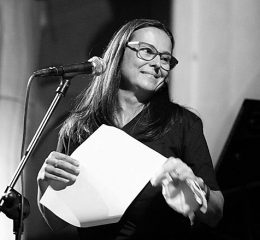




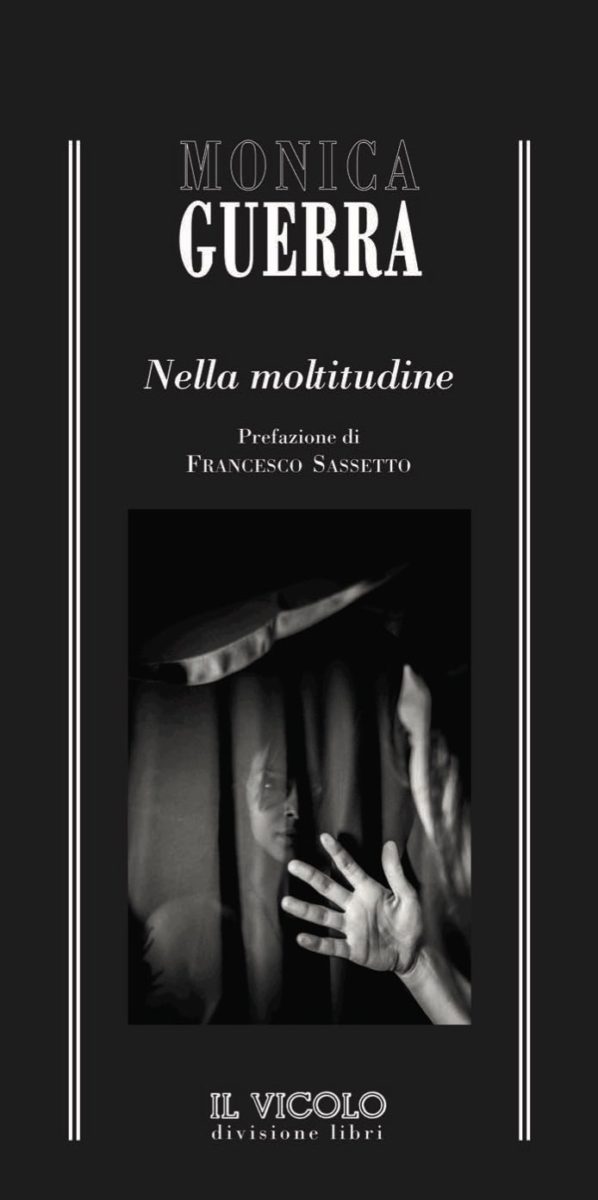
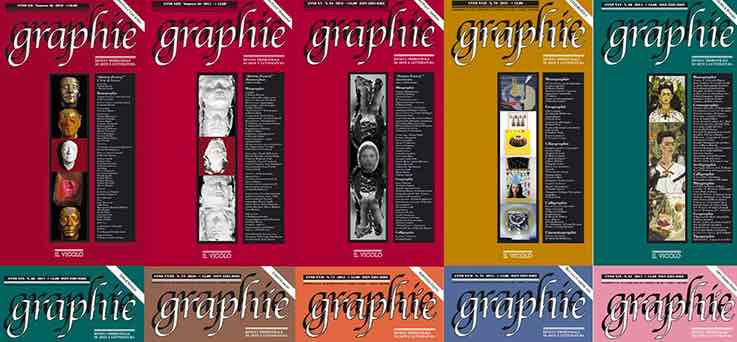
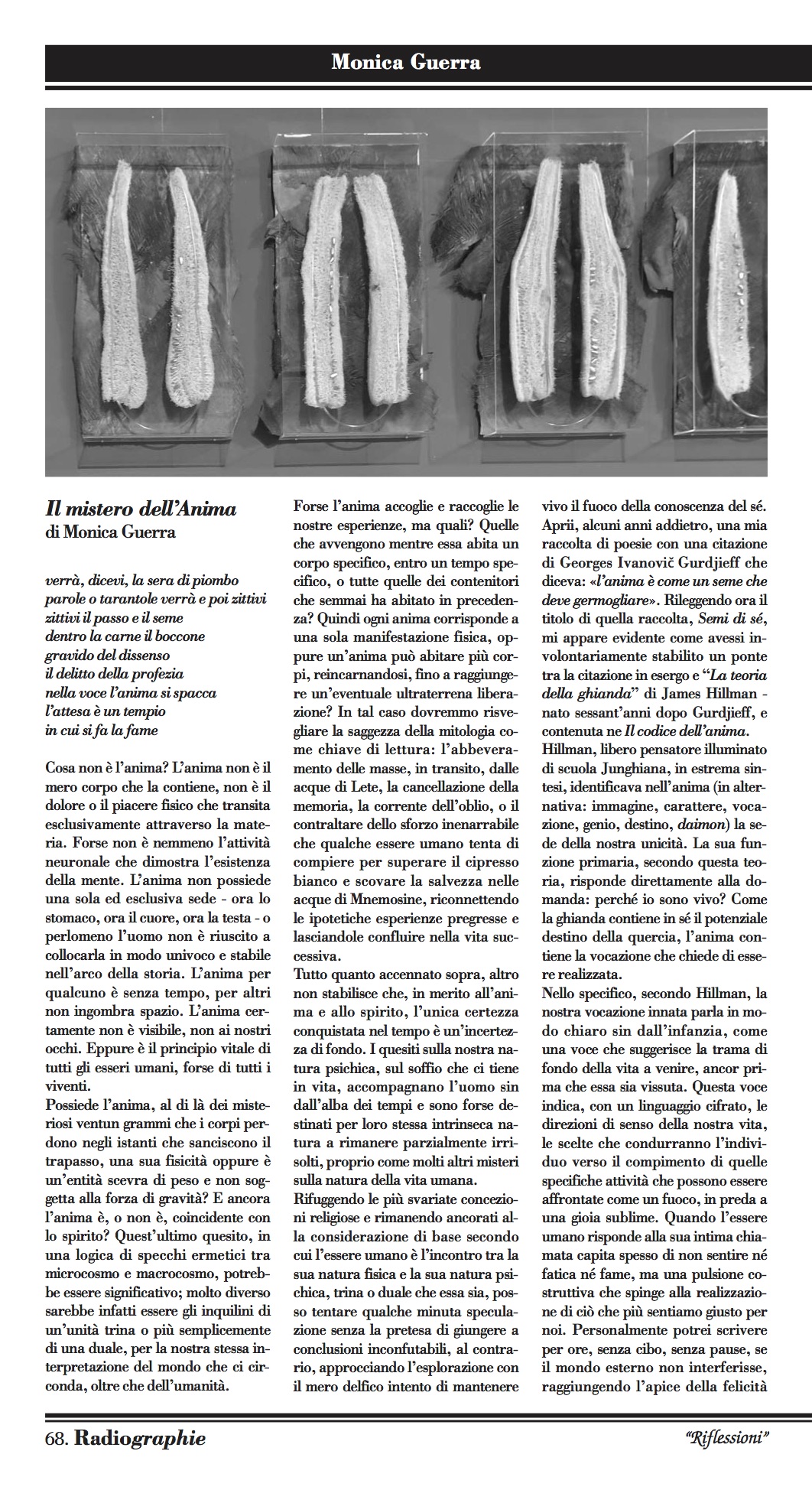
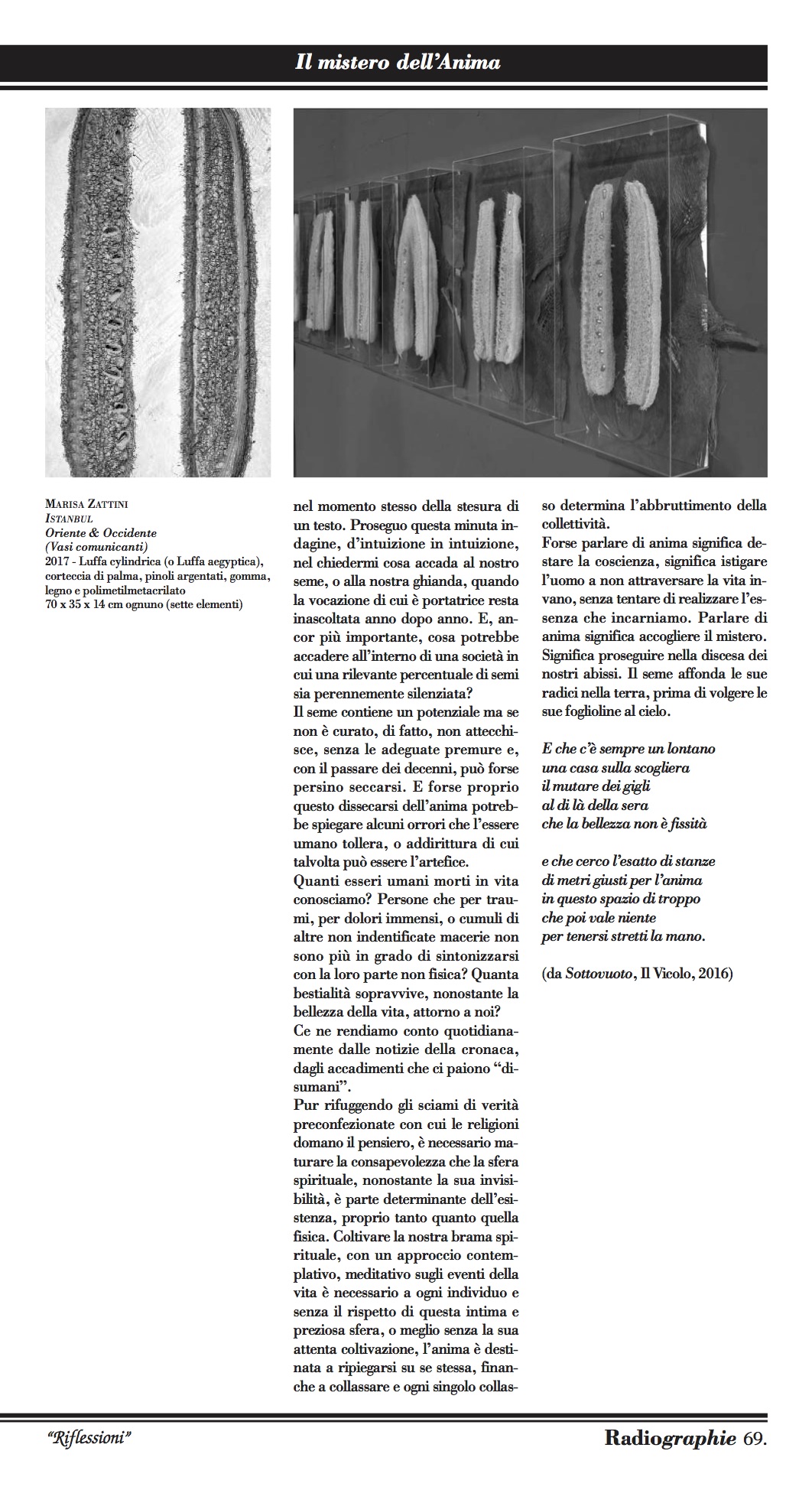

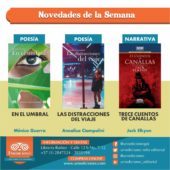 En el umbral (Uniediciones, 2019)
En el umbral (Uniediciones, 2019)